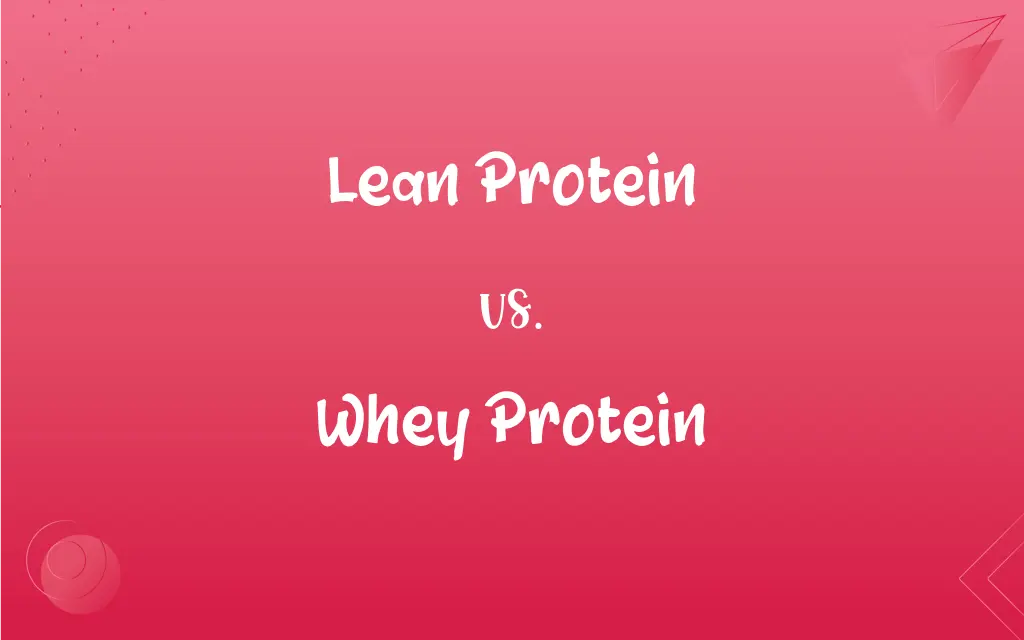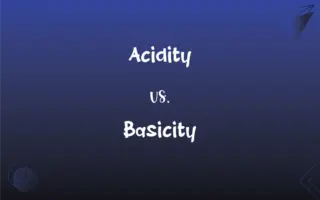Lean Protein vs. Whey Protein: What's the Difference?
Edited by Aimie Carlson || By Harlon Moss || Published on December 13, 2023
Lean protein refers to protein sources low in fat, while whey protein is a complete protein derived from milk.

Key Differences
Lean protein encompasses a variety of protein sources that are low in fat, like chicken breast, turkey, and legumes. Whey protein, on the other hand, is a byproduct of cheese production, derived specifically from milk. It contains all essential amino acids, making it a complete protein, while lean protein sources vary in their amino acid profiles.
The body absorbs whey protein more quickly than most lean proteins. This rapid absorption makes whey protein ideal for post-workout recovery. In contrast, lean proteins, being solid foods, generally take longer to digest, providing a more sustained release of amino acids.
Lean proteins provide additional nutrients like iron, zinc, and B vitamins, depending on the source. Whey protein is rich in branched-chain amino acids (BCAAs), which are crucial for muscle building and repair.
Lean protein is versatile in culinary use, fitting into various meals. Whey protein is often consumed as a supplement, added to smoothies, or in protein bars, offering a convenient protein boost, especially for athletes or those with high protein requirements.
People with lactose intolerance or dairy allergies might avoid whey protein, whereas lean protein offers a broader range of options for different dietary needs, including plant-based sources.
ADVERTISEMENT
Comparison Chart
Source
Derived from various animals and plants
Derived from milk
Fat Content
Generally low in fat
Low to moderate fat, depending on the form
Digestion Rate
Slower, depending on the food
Fast-absorbing
Amino Acid Profile
Varies with the source
Complete with all essential amino acids
Dietary Versatility
Broad, including vegetarian options
Limited to dairy-based
ADVERTISEMENT
Lean Protein and Whey Protein Definitions
Lean Protein
Lean protein is a source of protein with a low fat content.
Chicken breast is an excellent lean protein for a balanced diet.
Whey Protein
Whey protein is a complete protein containing all essential amino acids.
Whey protein bars are a convenient snack for protein intake on the go.
Lean Protein
Lean protein refers to protein-rich foods with reduced calorie content.
Tofu is a versatile lean protein that can be used in various cuisines.
Whey Protein
Whey protein is a byproduct of cheese production, used as a dietary supplement.
Athletes often use whey protein shakes for muscle recovery.
Lean Protein
Lean protein includes plant-based sources high in protein but low in fats.
Lentils are a great lean protein option for vegetarians.
Whey Protein
Whey protein is a soluble, easy-to-digest form of protein.
Whey protein is popular in meal replacements for its digestibility.
Lean Protein
Lean protein refers to meats with minimal fat.
Grilled salmon is a tasty way to incorporate lean protein into meals.
Whey Protein
Whey protein is a high-quality protein powder derived from milk.
Adding whey protein to a smoothie can boost its protein content.
Lean Protein
Lean protein encompasses low-fat dairy products.
Greek yogurt is a delicious source of lean protein.
Whey Protein
Whey protein is a lactose-containing dairy protein.
People with lactose intolerance might experience discomfort from whey protein.
FAQs
Are all lean proteins low in calories?
Generally, yes, as they have less fat, but calorie content also depends on preparation methods.
Does whey protein contain all essential amino acids?
Yes, whey protein is a complete protein containing all essential amino acids.
Is whey protein suitable for lactose-intolerant people?
It depends; some forms of whey protein may contain lactose, which could be problematic for those with lactose intolerance.
Can lean protein help in weight loss?
Yes, due to its low fat and high protein content, lean protein can be beneficial in weight loss diets.
Is whey protein only for bodybuilders?
No, whey protein can be beneficial for anyone needing a high-quality protein source, not just bodybuilders.
What is whey protein?
Whey protein is a complete protein derived from milk, often used as a supplement.
What is lean protein?
Lean protein is protein from sources with low fat content, like poultry, fish, and plant-based options.
Can vegetarians consume lean protein?
Yes, there are vegetarian lean proteins like lentils, beans, and tofu.
Can whey protein be used as a meal replacement?
While it can be part of a meal replacement, it shouldn't be the sole nutrition source due to lack of other essential nutrients.
Is fish considered a lean protein?
Many fish, especially white-fleshed fish, are considered lean proteins.
Can lean protein sources be high in cholesterol?
Some, like certain meats, can be higher in cholesterol, so selection and moderation are important.
Are eggs considered lean protein?
Egg whites are lean protein, while whole eggs have more fat and cholesterol.
Does whey protein aid in muscle recovery?
Yes, its high BCAA content makes it excellent for muscle repair and growth.
Do all lean proteins have the same amount of protein?
No, the protein content varies among different lean protein sources.
Can whey protein be consumed daily?
Yes, it can be part of a daily diet, but intake should align with individual protein needs and dietary balance.
Does cooking method affect the leanness of protein?
Yes, cooking methods like frying can add fat, making the protein less lean.
Can whey protein be plant-based?
No, whey protein is exclusively derived from dairy.
Is whey protein good for weight loss?
It can be, as it helps in muscle maintenance and satiety, which are important in weight management.
Is lean protein easy to digest?
It varies; plant-based sources are often easier to digest than some meat options.
Can whey protein cause allergies?
Yes, individuals allergic to dairy may react to whey protein.
About Author
Written by
Harlon MossHarlon is a seasoned quality moderator and accomplished content writer for Difference Wiki. An alumnus of the prestigious University of California, he earned his degree in Computer Science. Leveraging his academic background, Harlon brings a meticulous and informed perspective to his work, ensuring content accuracy and excellence.
Edited by
Aimie CarlsonAimie Carlson, holding a master's degree in English literature, is a fervent English language enthusiast. She lends her writing talents to Difference Wiki, a prominent website that specializes in comparisons, offering readers insightful analyses that both captivate and inform.






































































